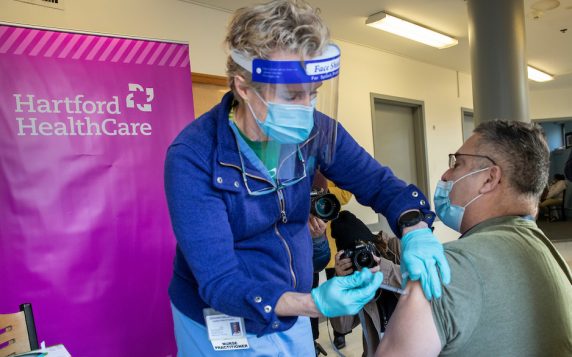The Delta variant is a different COVID-19 animal. It’s more than twice as transmissible as previous variants. Unvaccinated people infected with Delta are at higher risk of hospitalization. And it produces slightly different symptoms than last year’s COVID.
In the past, patients typically reported cough, fever and loss of taste and smell as primary symptoms. If you’re unvaccinated, these are still common symptoms if infected with Delta, the dominant strain in the United States,
Here are likely early symptoms if you’re vaccinated:
- Headache.
- Sore throat.
- Runny nose.
- Fever.
- Persistent cough.
Sound familiar? If you’re vaccinated, a Delta infection sounds a lot like the common cold.
“The vaccine is doing exactly what it’s supposed to do,” Dr. Ulysses Wu, Hartford HealthCare’s System Director of Infection Disease and Chief Epidemiologist. “It’s supposed to take a potentially lethal disease that causes systemic fever, cough and respiratory failure and turn it into a cold.”
A recent study, published in The Lancet Infectious Diseases, found the average person in the United Kingdom infected now with Delta is 40 percent more likely than someone infected during the pre-Delta winter to require hospitalization. Delta was first identified in England in March. By late May, it accounted for more than 50 percent of COVID cases. It now accounts for more than 98 percent of cases.
Related: Looking For A COVID Test?
Delta has been spreading in the United States since at least May. Most Delta-related hospitalizations and deaths are among the unvaccinated.
Delta is more likely to spread through tiny aerosol particles emitted when people open their mouth, whether to speak, breathe, talk or yawn. These tiny droplets could contain more virus particles when measured against larger moisture droplets. Even if fully vaccinated, you can still spread a Delta variant breakthrough infection virus, according to the Centers for Disease Control and Prevention. A Delta infection produces similar viral genetic material, regardless of vaccination status.
“However,” says the CDC, “like prior variants, the amount of viral genetic material may go down faster in fully vaccinated people when compared to unvaccinated people. This means fully vaccinated people will likely spread the virus for less time than unvaccinated people.”



